Mine construction and upgrading activities at Ivanhoe’s three key
development projects in Sub-Saharan Africa highlight
Ivanhoe’s achievements in 2015
TORONTO, CANADA ‒ Ivanhoe Mines (TSX: IVN) today announced its financial results for the year ended December 31, 2015. All figures are in US dollars unless otherwise stated. Ivanhoe Mines is a Canadian mining company focused on advancing its three mine-development projects in Sub-Saharan Africa: the Platreef platinum-palladium-gold-nickel-copper discovery in South Africa; and the Kipushi zinc-copper-lead-germanium mine and the Kamoa copper discovery in the DRC.
HIGHLIGHTS
- On December 8, 2015, Ivanhoe Mines and Zijin Mining Group Co. Ltd., of China, completed a landmark, strategic co-development transaction on the Kamoa Copper Project in the Democratic Republic of Congo (DRC) whereby Zijin, through a subsidiary company, acquired a 49.5% interest in Kamoa Holding Limited for a total of $412 million in a series of payments. Ivanhoe received an initial $206 million from Zijin on December 8, 2015; the remaining $206 million will be received in five equal installments, payable every 3.5 months from December 8, 2015. In addition, Ivanhoe sold a 1% share interest in Kamoa Holding to privately-owned Crystal River Global Limited for $8.32 million.
- The first installment payment from Zijin, in the amount of $41.2 million, was received by Ivanhoe Mines on March 23, 2016.
- In an earlier, separate transaction, on April 20, 2015, Zijin Mining Group completed a private placement to help advance Ivanhoe’s three mine-development projects in Africa. Zijin acquired approximately 9.9% of Ivanhoe Mines’ issued and outstanding common shares at a price of C$1.36 per share. The placement provided Ivanhoe Mines with gross proceeds of approximately C$105 million.
- Ivanhoe Mines recorded a total comprehensive profit of $668.3 million for the year ending December 31, 2015. The profit was attributable mainly to the gain on the partial sale of Kamoa Holding of $357.7 million and the re-measurement to fair value of the interest retained in the joint venture of $376.1 million.
- On January 25, 2016, the Kamoa exploration team reported a new discovery at its Kakula Prospect. The Kakula Discovery is situated within the 400-square-kilometre Kamoa Mining Licence area and represents a major extension of the Kamoa copper deposit, which the company discovered in 2008. Two exploration drill holes completed in late 2015 in the Kakula exploration area — DD996 (13.14 metres true width of 5.26% copper) and DD997 (14.94 metres true width of 5.33% copper) — rank among the highest-grade and highest-grade-thickness intersections drilled to date within the Kamoa copper deposit licence area.
- On February 23, 2016, Ivanhoe Mines reported the positive findings of an independent pre-feasibility study (PFS) for the first phase of development of the Kamoa Copper Project. First phase of development envisages an annual production rate of three million tonnes of ore per annum at an average grade of 3.86% copper over a 24-year mine life, resulting in annual copper production of approximately 100,000 tonnes. Initial capital costs, including contingency, is estimated at $1.2 billion, approximately $200 million lower than estimated in the Kamoa 2013 preliminary economic assessment (PEA).
- Construction work on the twin declines at Kamoa began in March 2016. The declines are designed to intersect the high-grade copper mineralization in the initial mining area at Kansoko Sud, approximately 150 metres below surface. Ivanhoe’s drilling program in this area defined a thick, near-surface zone of high-grade copper mineralization, where a drill hole intercepted 15.7 metres (true width) of 7.04% copper. Byrnecut Underground Congo SARL (BUCS) was awarded the contract for the permanent support of the box-cut walls and the initial 1.2 kilometres of development for each of the two declines.
- Also in the DRC, on January 27, 2016, Ivanhoe Mines announced the receipt of a new, independent, Mineral Resource estimate for the company’s historic, high-grade, Kipushi zinc-copper-germanium-lead-silver mine. Kipushi’s Big Zinc Zone is estimated to contain Measured and Indicated Mineral Resources of 10.2 million tonnes at 34.89% zinc, containing 7.8 billion pounds of zinc and adjacent zones of copper-rich mineralization containing Measured and Indicated Mineral Resources of 1.6 million tonnes at 4.01% copper, containing 144 million pounds of copper.
- With a current Mineral Resource now established at Kipushi, Ivanhoe Mines is continuing its upgrading work at the mine and evaluating technical and infrastructure options to best advance the project. A preliminary economic assessment is expected to be finalized in the near future.
- At the Platreef PGM Project in South Africa, Shaft 1 development has made good progress. Pre-sinking of the shaft has been completed to a depth of 54 metres below surface. The changeover from pre-sinking activities to main-sinking activities is expected to be completed by April 2016, which will enable the start of the main sinking. Aveng Mining, the shaft sinking contractors, expects to sink at a daily average rate of approximately 2.5 metres. Shaft 1 is expected to reach the Flatreef Deposit at a depth of 777 metres below surface by late 2017.
- The headgear design for the six-million-tonne-per-year permanent hoisting facility for Platreef’s Shaft 2 has been completed by South Africa-based Murray & Roberts Cementation. Ivanhoe expects to start Shaft 2 early works in 2017, including civil work for the box cut and hitch foundation.
- Ivanhoe announced in February 2015 that Ivanplats, Ivanhoe’s 64%-owned subsidiary that owns the Platreef Project, had achieved Level 3 status in its first verification assessment on a broad-based, black economic empowerment scorecard, the highest-ranking platinum-sector mining company in compliance with South Africa’s black empowerment laws. Ivanplats again achieved Level 3 status in February 2016, further demonstrating the company’s dedication and commitment toward transformation on all levels of business.
- The three projects achieved a combined nine million hours of lost-time-injury-free (LTIF) work by the end of 2015, reflecting, in part, the company’s continued efforts to prioritize the management of health and safety on its job sites. Ivanhoe had recorded 0.5 million LTIF hours at Platreef, 4.56 million hours at Kamoa and 3.90 million hours at Kipushi to the end of 2015. The Platreef Project reported two lost-time injuries in Q4 2015.
Principal Projects and Review of Activities
1. Platreef Project
64%-owned by Ivanhoe Mines
South Africa
The Platreef Project in South Africa’s Limpopo Province is owned by Ivanplats (Pty.) Ltd., which is 64%-owned by Ivanhoe Mines. A Japanese consortium of ITOCHU Corporation and its affiliate, ITC Platinum, plus Japan Oil, Gas and Metals National Corporation and JGC Corporation, owns a 10% interest in Ivanplats, which it acquired in two tranches for a total investment of $290 million. The remaining 26% interest is held by Ivanhoe’s broad-based, black economic empowerment partners, which include communities, employees and entrepreneurs.
Ivanhoe announced in February 2015 that Ivanplats had achieved Level 3 status in its first verification assessment on a B-BBEE scorecard, the highest-ranking platinum-sector mining company in compliance with South Africa’s black empowerment laws. Ivanplats again achieved Level 3 status in February 2016, further demonstrating the company’s dedication and commitment toward transformation on all levels of business.
The Platreef Project hosts an underground deposit of thick, platinum-group metals, nickel, copper and gold mineralization in the Northern Limb of the Bushveld Igneous Complex, approximately 280 kilometres northeast of Johannesburg and eight kilometres from the town of Mokopane in Limpopo Province.
Figure 1: Aerial view of the Platreef Project site.

Health and safety at Platreef
The Platreef Project reached 5,379,302 million hours worked by February 29, 2016. The project recorded 4.8 million lost-time-injury-free hours at Platreef up until the end of Q3 2015. Two unfortunate lost-time injuries (LTIs) were recorded in October 2015 and since then, the project has recorded more than 750,000 worker hours without a LTI. The Platreef Project continues to strive toward its workplace objective of an environment that causes zero harm to employees, contractors, sub-contractors and consultants.
Shaft 1 construction
Shaft 1 development has made good progress. The pre-sinking activities have been completed and the shaft depth was 54 metres below surface on February 15, 2016. The changeover from pre-sinking activities to main sinking activities is expected to be completed by April 2016, which will enable the start of the main sinking. Aveng Mining, the shaft-sinking contractor, expects sinking to advance at an average daily rate of approximately 2.5 metres. Shaft 1 is expected to reach the Flatreef Deposit at a depth of 777 metres below surface by late 2017. Sinking will continue to a planned final depth of 975 metres below surface. Development work will include three stations at depths of 450 metres, 750 metres and 850 metres below surface.
Work has been completed on the internal electricity substation, which will have a capacity of five million volt-amperes (MVA). Construction is underway on the power transmission lines from Eskom, the South African public electricity utility, which will supply the electrical power to be used for the sinking of Shaft 1. Back-up generators have been installed to ensure continuous sinking operations even if the power supply from Eskom is interrupted.
Figure 2: Lowering of the five-deck stage and bank steelwork into Shaft 1.
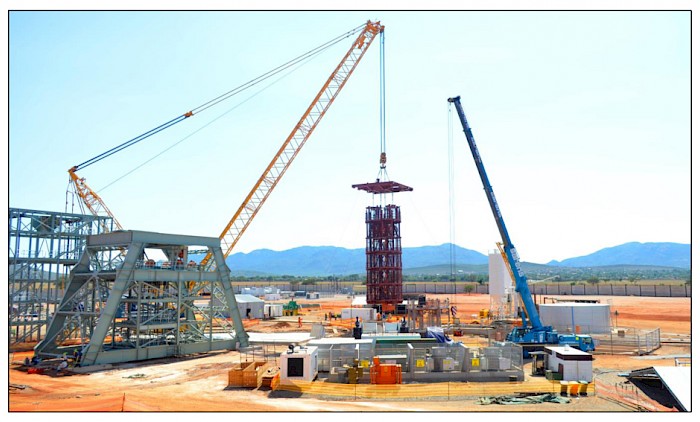
Figure 3: Construction of headgear for main sinking operations.
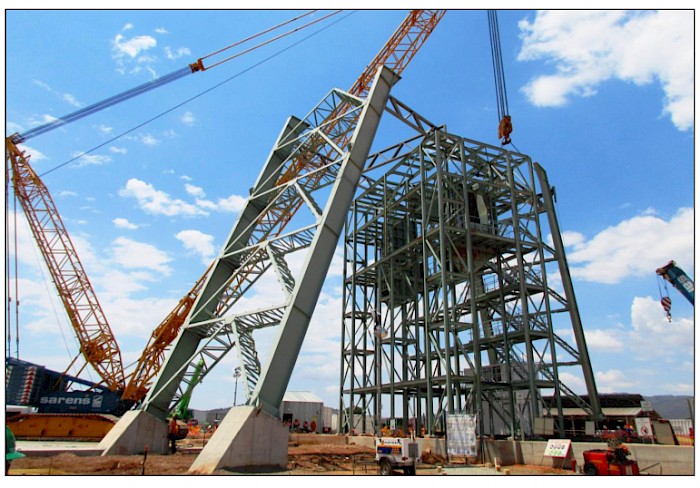
Figure 4: Shaft 1 main-sink headgear.
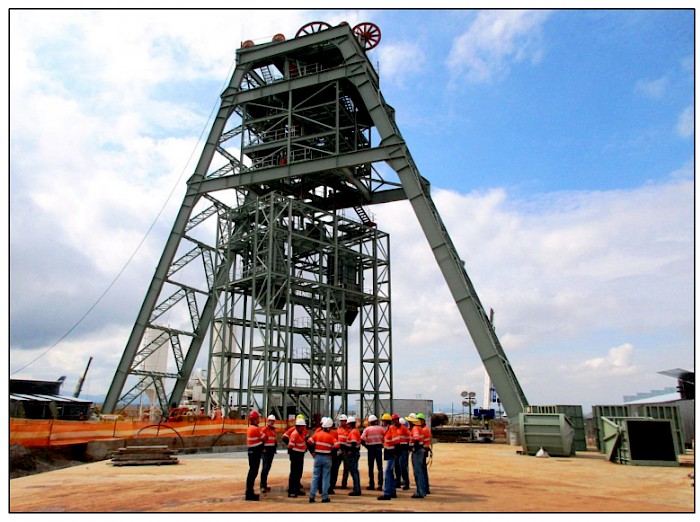
Figure 5: Internal view of shaft-sinking activities during the pre-sink phase.
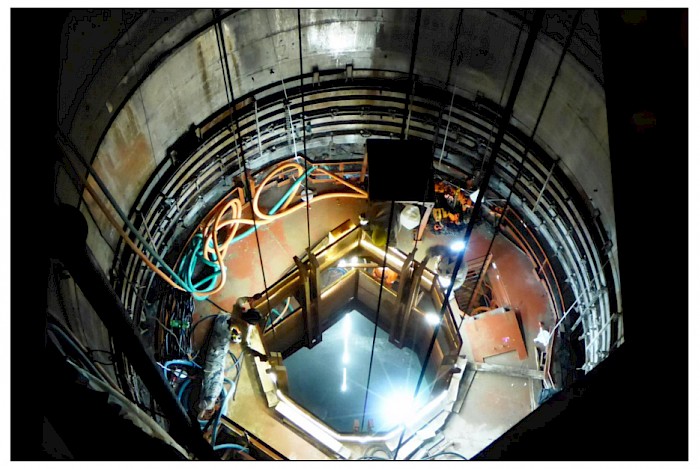
Other on-site work includes the construction of the primary terraces for Shaft 1, storm-water drains and ponds, workshops and stores. A total of 511, or 74%, of the 693 permanent and contract workers presently employed by Ivanplats are from the local area.
Platreef implementing a phased approach to a large, underground, mechanized mine
Ivanhoe completed a pre-feasibility study (PFS) in January 2015 that covered the first phase of development that is expected to include construction of an underground mine, concentrator and other associated infrastructure.
In August 2015, Ivanhoe started work on a feasibility study (FS) based on the first phase of development. The FS is being managed by principal consultant, DRA Global, along with other specialized sub-consultants including Stantec Consulting, Murray & Roberts Cementation, SRK, Golder Associates and Digby Wells Environmental. The FS is scheduled to be completed by Q2 2017.
There will be opportunities to refine and modify the timing and capacities of subsequent phases of production to suit market conditions during the development and commissioning of the first phase.
Mineral resources in the Flatreef underground discovery
The Flatreef Mineral Resource, with a strike length of 6.5 kilometres, lies predominantly within a flat-to- gently dipping portion of the Platreef mineralized belt at relatively shallow depths of approximately 700 to 1,100 metres below the surface.
The Flatreef Deposit is characterized by its very large vertical thicknesses of high-grade mineralization and a platinum-to-palladium ratio of approximately 1:1, which is significantly higher than other recent PGM discoveries on the Bushveld’s Northern Limb. The grade shells used to constrain mineralization in the Flatreef Indicated Mineral Resource area have average true thicknesses of approximately 24 metres at a cut-off grade of 2.0 grams per tonne (g/t) of platinum, palladium and gold (2PE+Au). The Indicated Mineral Resource grade at an equivalent 2.0-gram-per-tonne 3PE+Au cut-off is 4.1 g/t 3PE+Au, 0.34% nickel and 0.17% copper. Flatreef’s Indicated Mineral Resources of 214 million tonnes contain an estimated 28.5 million ounces of platinum, palladium, gold and rhodium, 1.6 billion pounds of nickel and 0.8 billion pounds of copper. Ivanhoe has declared an initial Probable Mineral Reserve of 15.5 million ounces of platinum, palladium, rhodium and gold, using a declining Net Smelter Return (NSR) cut-off of $100/t-$80/t.
Planned mining methods
The selected mining areas in the current Platreef mine plan occur at depths ranging from approximately 700 metres to 1,200 metres below the surface. The main access to the ore body and ventilation system is expected to be comprised of four vertical shafts. Shaft 2 will host the main personnel transport cage, material and ore-handling systems, while Shafts 1, 3 and 4 will be utilized for ventilation to the underground workings. Shaft 1, now under development, will be used for initial access to the ore body and early underground development.
Mining will be performed using highly productive, mechanized methods, including long-hole stoping, drift-and-bench and drift-and-fill mining methods. The mined-out areas within the ore body will be backfilled with a paste mixture that utilizes tailings from the process plant and cement. The ore will be hauled from the stopes to a series of ore passes that connect to a main haulage level, which will be connected to Shaft 2, where it will be hoisted to the surface for further processing.
Figure 6: Final design of Shaft 2 headgear.
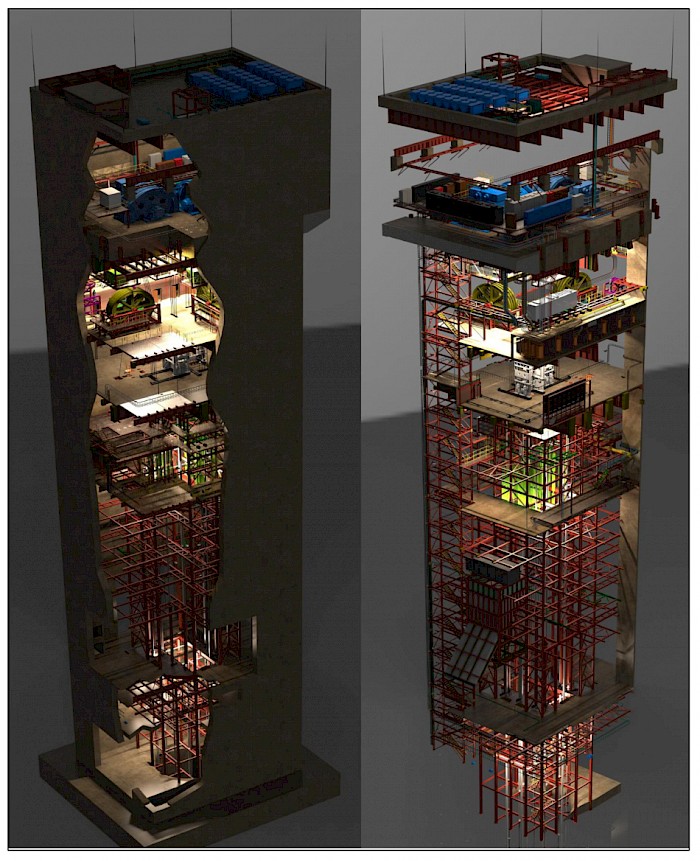
Shaft 2 will have an internal diameter of 10.0 metres and will be capable of hoisting six million tonnes per year. The headgear design for the six-million-tonne-per-year permanent hoisting facility has been completed by South Africa-based Murray & Roberts Cementation. Ivanhoe expects to start Shaft 2 early works in 2017, including civil work for the box-cut and hitch-foundation.
Bulk water and electricity supply
The Olifants River Water Resource Development Project (ORWRDP) is designed to deliver water to the Eastern and Northern limbs of South Africa’s Bushveld Igneous Complex. The project consists of the new De Hoop Dam, the raised wall of the Flag Boshielo Dam and related pipeline infrastructure that ultimately will deliver water to Pruissen, southeast of the Northern Limb. The Pruissen Pipeline Project will be developed to deliver water onward from Pruissen to the municipalities, communities and mining projects on the Northern Limb. Ivanhoe is a member of the ORWRDP’s Joint Water Forum. The Minister of Water & Sanitation has directed that the Trans-Caledon Tunnel Authority will serve as the implementing agent for the outstanding phases of the ORWRDP scheme, which include the Phase 2B pipeline from Flag Boshielo Dam to Mokopane.
Participants in the water development scheme are required to indicate their water requirements so that the total water demand may be calculated relative to the scheme’s capacity. The Platreef Project’s water requirement for the first phase of development is projected to peak at approximately 10 million litres per day. Ivanhoe also is continuing to investigate various alternative bulk water sources, including bulk grey water allocations from local municipalities.
The Platreef Project’s electricity requirement for a four-million-tonne-per-year underground mine, concentrator and associated infrastructure has been estimated at approximately 100 million volt-amperes (MVA). As power is required for the initial mine development work, including shaft sinking, before the main power supply becomes available, an agreement with Eskom has been reached for the supply of 5MVA of temporary construction power. Ivanhoe opted for a self-build option for the permanent power, which enables Ivanhoe to manage the construction of the distribution lines from the Eskom Borutho sub-station to the Platreef Mine.
Figure 7: Construction of the Eskom Borutho substation.
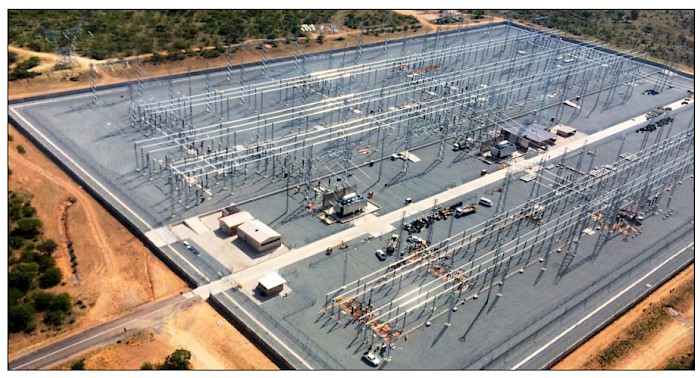
Development of human resource and job skills
Work is progressing well on the further implementation of Ivanhoe’s Social and Labour Plan (SLP), to which the Company has pledged a total of R160 million ($10 million) during the first five years, until November 2019. The approved plan includes R67.2 million ($4 million) for the development of job skills among local residents and R87.7 million ($6 million) for local economic development projects. Additional internal training is planned to provide members of the current workforce with opportunities to expand their skills.
Adult basic education and training for the communities has begun in four community centres run by the Department of Higher Education and Training, forging a partnership between Ivanhoe and the Department.
The first 80 students to participate in Platreef’s non-core training program started their training at the beginning of March 2016. Further related training programs are planned later in the year.
Ivanhoe awarded five fully-paid bursaries to local university students in 2015. To date in 2016, Ivanhoe awarded fully-paid bursaries to seven local university students in diverse disciplines. Ivanhoe also is investing in developing local artisans by establishing fully paid community Learnerships in Engineering.
Ivanhoe’s R24 million ($2 million) partnership between South Africa’s University of Limpopo and Laurentian University in Canada to develop and equip Limpopo University’s geology department is well underway. A principal goal of the five-year partnership, which is renewable for a further five years, is to develop and equip the University of Limpopo’s geology department to become a centre of excellence in geosciences. Combined with a scholarship awarded to Laurentian by the International Development Research Centre, these funds will create educational opportunities for 35 University of Limpopo students to study in Canada. Ivanhoe also will provide in-service training opportunities for students from both universities and assist them in conducting research on the Northern Limb of the Bushveld Complex.
2. Kipushi Project
68%-owned by Ivanhoe Mines
Democratic Republic of Congo (DRC)
The Kipushi copper-zinc-germanium-lead mine, in the Democratic Republic of Congo (DRC), is adjacent to the town of Kipushi and approximately 30 kilometres southwest of Lubumbashi. It also is located on the Central African Copperbelt, approximately 250 kilometres southeast of Ivanhoe’s Kamoa Project, and less than one kilometre from the Zambian border. Ivanhoe acquired its 68% interest in the Kipushi Project in November 2011; the balance of 32% is held by the state-owned mining company, La Générale des Carrières et des Mines (Gécamines).
Health and safety at Kipushi
The Kipushi Project achieved a total of 3,905,536 lost-time-injury-free hours (1,244 days) to the end of Q4 2015. Malaria remains the most frequent health concern at Kipushi; during 2015, there was an average of 11 cases each month among employees. In an effort to reduce the incidence of malaria in the Kipushi community, a Water Sanitation and Health (WASH) program has been initiated in cooperation with the Territorial Administrator and the local community. The main emphasis in the program’s first phase is cleaning storm drains in the municipality to prevent the accumulation of ponded water, where malarial mosquitos breed.
Following DRC government approval of the Fionet program, training of medical staff at medical service providers in the Kipushi Health Zone on the use of the Deki™ rapid malaria test reader started in December 2015 and will continue on an ongoing basis. The objective is to establish the Fionet program in 37 medical centres in the Kipushi Health Zone. The program eventually will be rolled out to 300 clinics in the Haut-Katanga province.
Figure 8: Training on usage of the Fionet Deki™ Rapid Malaria Test reader at the Cinquantenaire Hospital in Kipushi.
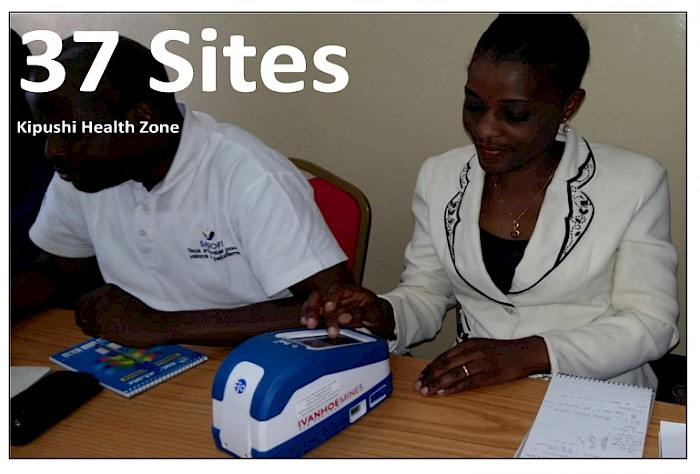
Figure 9: Community relations officer Olivia Simamba assisting with the government-sponsored oral polio vaccine program.
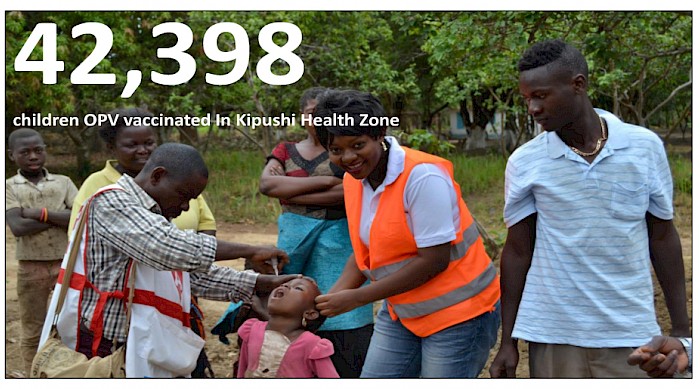
Project development and infrastructure
Work began in March 2014 on the underground diamond-drilling program at the Kipushi Project, a major advance made possible by the successful dewatering program directed by Ivanhoe Mines during the previous three years following the company’s acquisition of the historic mine in November 2011.
The mine, which had been placed on care and maintenance in 1993, flooded in early 2011 due to a lack of pump maintenance over an extended period. At its peak, water reached 851 metres below the surface level. A major milestone was reached in December 2013 when Ivanhoe restored access to the mine’s principal haulage level at 1,150 metres below the surface. Since then, crews have been upgrading underground infrastructure to permanently stabilize the water levels and support the drilling program.
Recent improvements on Shaft 5 included dewatering to expose the main pump station at the 1,200-metre-level, installation of new hoist ropes on the Shaft 5 Maryanne rescue hoist, stripping of the 1,200-metre-level pump station and refurbishment and commissioning of the friction-reeler gearbox. Other improvements included the design and construction of permanent dams and pumping infrastructure at the 1,112-metre-level Cascade shaft complex, the completion of emergency exit ladders and platforms in shafts P2, P3 and P15, the installation of an emergency hoist in Shaft 3 and safety-cage door interlocks in shafts P2, P3 and P5 Maryanne.
Water levels were stabilized below the 1,150-metre-level haulway and the 1,272-metre-level hanging-wall drift, enabling access for the drilling program that targeted the Série Récurrente, Fault and Big Zinc zones. The exploration drilling program has been completed and an updated resource has been declared on the previously underexplored Big Zinc deposit. A preliminary economic assessment for the Kipushi Project is being finalized and is expected to be published in the near future.
In March 2016, ongoing pumping succeeded in lowering the water in Shaft 5 below the 1,230-metre-level to facilitate cleaning out of the shaft bottom in advance of the installation of new hoist ropes on the personnel cage, as well as repairs and upgrades to the hoisting infrastructure.
Figure 10: Sulzer centrifugal pump at the 1,200-metre-level pump station in Shaft 5.
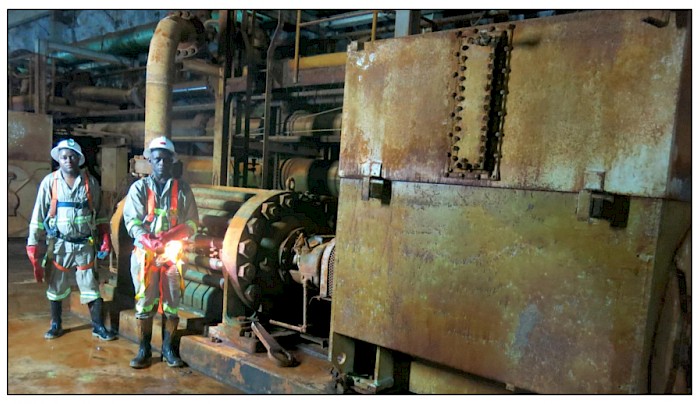
Figure 11: New Grifo centrifugal pumps to be installed at the 1,200-metre-level pump station.
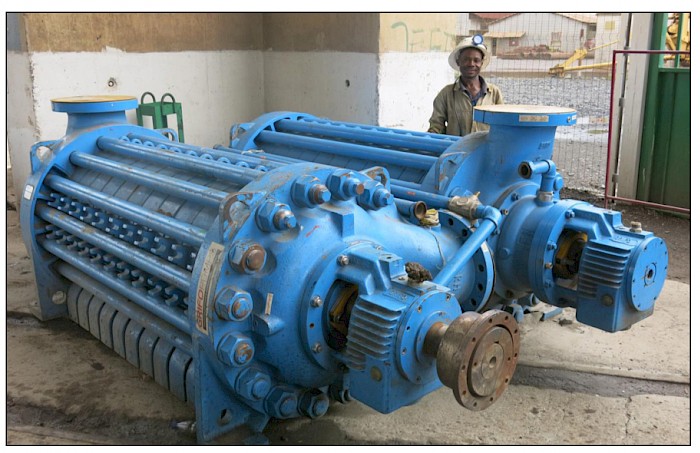
Figure 12: Delivering the new cable for the Shaft 5 man winder.
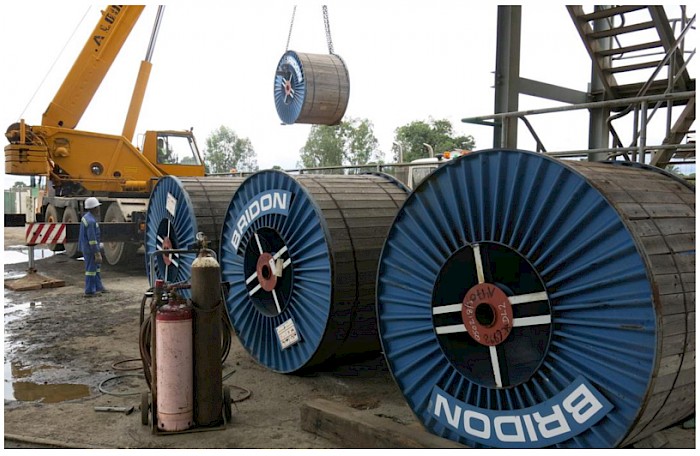
Confirmatory and exploration drilling
Drilling in Q4 2015 totalled 1,384 metres, for a total of 25,419 metres since Ivanhoe Mines started the Kipushi Project’s drilling program in March 2014. The underground drilling program was completed in October 2015 and the contractor demobilized. Additional exploration drilling in Q3 and Q4 in the southern extension area successfully confirmed that both the Big Zinc Zone and Fault Zone remain open at depth and to the south, with significant intersections on both structures. Additional high-grade copper-zinc-germanium mineralization also was discovered in the Fault Zone and in Fault Zone Splay in the immediate footwall of the Fault Zone. Results of the final exploration holes were included in the data set used for the calculation of an updated Mineral Resource estimate in January 2016.
Independent Mineral Resource estimate
Ivanhoe announced the new Mineral Resource estimate for Kipushi on January 27, 2016. The estimate was prepared in accordance with the 2014 CIM definition standards, incorporated by reference into Canadian National Instrument 43-101 – Standards of Disclosure for Mineral Projects. Ivanhoe is preparing a NI 43-101-compliant Preliminary Economic Assessment for Kipushi.
Highlights of the initial estimate, prepared by the MSA Group, of Johannesburg, South Africa:
- Measured and Indicated Mineral Resources in the Big Zinc Zone of 10.2 million tonnes at grades of 34.89% zinc, 0.65% copper, 19 grams per tonne (g/t) silver and 51 g/t germanium, at a 7% zinc cut-off, containing an estimated 7.8 billion pounds of zinc.
- The zinc grade of Kipushi’s Measured and Indicated Mineral Resources in the Big Zinc Zone is more than twice as high as the world’s next-highest-grade zinc project, independently ranked by Wood Mackenzie, an international industry research and consulting group, based on contained zinc.
- Zinc-rich Inferred Mineral Resources total an additional 1.9 million tonnes at grades of 28.24% zinc, 1.18% copper, 10 g/t silver and 53 g/t germanium. The Inferred Mineral Resources are contained partially in the Big Zinc Zone and partially in the Southern Zinc Zone.
- Kipushi’s copper-rich Measured and Indicated Mineral Resources contained in the adjacent Fault Zone, Fault Zone Splay and Série Récurrente Zone total an additional 1.63 million tonnes at grades of 4.01% copper, 2.87% zinc and 22 g/t silver, at a 1.5% copper cut-off, containing 144 million pounds of copper. Copper-rich Inferred Mineral Resources in these zones total an additional 1.64 million tonnes at grades of 3.30% copper, 6.97% zinc and 19 g/t silver.
- Ivanhoe’s exploration program has demonstrated that zinc and copper mineralization of the Kipushi system remains open laterally and at depth. Results recently received from hole KPU081, drilled on section line 6S, confirm high-grade copper-zinc mineralization at depth. KPU081 intersected 60.5 metres (21.7 metres true thickness) grading 2.6% copper, 36.2% zinc, 19 g/t silver and 204 g/t germanium to a depth of 1,763 metres. Included in this interval was an intersection from 580.9 metres to 591.3 metres (3.8 metres true thickness) grading 56.3% zinc, 0.5% copper, 12 g/t silver and 397 g/t germanium.
The MSA Mineral Resource estimate was based on the results of 84 drill holes completed at Kipushi by Ivanhoe Mines and an additional 107 historical holes drilled by Gécamines. Mineral Resource estimates were completed below the -1,150-metre-level on the Big Zinc Zone, Southern Zinc Zone, Fault Zone and Série Récurrente Zone. The Mineral Resources were categorized either as zinc-rich resources or copper-rich resources, depending on the most abundant metal.
For the zinc-rich zones, the Mineral Resource is reported at a base-case cut-off grade of 7.0% zinc and the copper-rich zones at a base-case cut-off grade of 1.5% copper. Given the considerable revenue that could be obtained from the additional metals in each zone, MSA considers that mineralization at these cut-off grades will satisfy reasonable prospects for economic extraction.
3. Kamoa Project
47%-owned by Ivanhoe Mines
South Africa
The Kamoa Copper Project, a joint venture between Ivanhoe Mines and Zijin Mining, is a very large, stratiform copper deposit with adjacent prospective exploration areas within the Central African Copperbelt, approximately 25 kilometres west of the town of Kolwezi and about 270 kilometres west of Lubumbashi. Ivanhoe sold a 49.5% share interest in Kamoa Holding Limited (Kamoa Holding), the company that presently owns 95% of the Kamoa Project, to Zijin Mining for an aggregate consideration of $412 million. In addition, Ivanhoe sold a 1% share interest in Kamoa Holding to privately-owned Crystal River Global Limited for $8.32 million – which Crystal River will pay through a non-interest-bearing, 10-year promissory note.
A 5%, non-dilutable interest in the Kamoa Project was transferred to the DRC government on September 11, 2012, for no consideration, pursuant to the DRC Mining Code. Ivanhoe also has offered to transfer an additional 15% interest to the DRC government on terms to be negotiated. Constructive and cordial negotiations over the offer are continuing between Ivanhoe Mines, Zijin and senior DRC government officials. Subsequent to the sale to Zijin and Crystal River, Ivanhoe owns an effective 47% of the Kamoa Project, which will decrease to an effective 40% should the additional 15% interest be transferred to the DRC government.
Kamoa is the world’s largest, undeveloped, high-gradecopper deposit. On February 23, 2016, an updated Mineral Resource estimate was issued for the Kamoa Project, with an effective date of May 2014. Kamoa’s Indicated Mineral Resources total 752 million tonnes grading 2.67% copper and containing 44.3 billion pounds of copper at a 1% copper cut-off grade and minimum thickness of three metres. In addition to the Indicated Resources, the updated estimate included Inferred Mineral Resources of 190 million tonnes grading 2.06% copper and containing 8.6 billion pounds of copper, also at a 1.0% copper cut-off grade and a minimum thickness of three metres.
Health and safety at Kamoa
Health and safety remain key priorities for workers and management alike at the Kamoa Project, where an excellent safety record has been achieved. By the end of 2015, a total of 4,562,671 hours had been worked without a lost-time injury.
The partnership with Fionet is a collaborative initiative to strengthen local responses to malaria in the DRC under the National Malaria Control Program. To date, 54 health centres in Haut-Katanga and Lualaba provinces are using the intelligent diagnostic device known as the Deki™ Reader. The device provides step‐by‐step guidance to health workers, helping to deliver rapid, accurate, diagnostic testing for malaria and transmitting results to a cloud database. The data then can be made available in real time to public health managers through the Fionet web portal for informed decision making and remote monitoring.
To date, 148 public health officials and healthcare providers have been trained as ultimate drivers of the program. Twelve master trainers from the Ministry of Health at the provincial level eventually will build capacity among health workers in a total of 300 healthcare facilities.
Figure 13: The Fionet program underway at a local clinic.
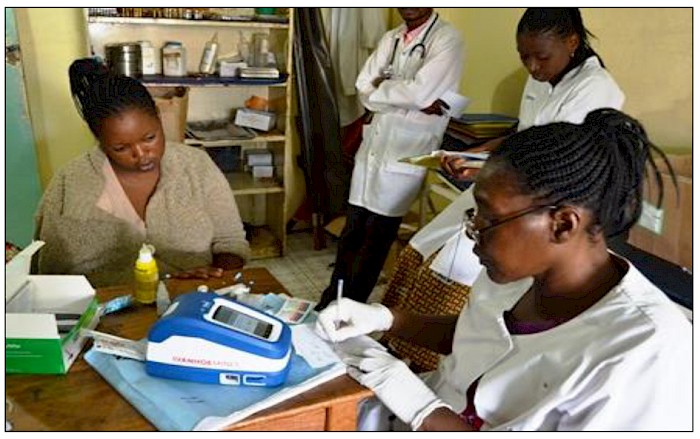
Diamond drilling progress
Limited drilling occurred in Q4 2015, with an additional 944 metres completed in four shallow holes. This brought the total metres drilled for the year to 2,664 metres in 17 holes. One hole was completed on the regional Makoko target and two holes were drilled in the Kakula area.
Kamoa’s exploration team makes major new copper discovery at the Kakula exploration area at the Kamoa Copper Project
Ivanhoe Mines reported on January 25, 2016, that the Kamoa exploration team had made a new tier-one, high-grade, shallow and flat-lying stratiform copper discovery, ideally situated for low-cost mechanized mining, in the Kakula exploration area, approximately five kilometres southwest of the currently defined resources at the Kamoa copper deposit. The Kakula Discovery is situated within the 400-square-kilometre Kamoa Mining Licence area and represents a major extension of the Kamoa copper deposit, which the company discovered in 2008.
Two exploration drill holes completed in late 2015 in the Kakula exploration area – DD996 and DD997 – rank among the highest-grade and highest-grade-thickness intersections drilled to date within the Kamoa copper deposit licence area.
DD996 intersected 24.16 metres (24.13 metres true width) of 3.48% copper, at a 1% copper cut off. At a higher cut-off of 2% copper, the intersection was 13.16 metres (13.14 metres true width) of 5.26% copper.
DD997 intersected 18.75 metres (18.47 metres true width) of 4.64% copper at a 1% copper cut-off and 15.17 metres (14.94 metres true width) of 5.33% copper at a 2% copper cut-off.
The two holes were drilled into an area of thick, high-grade copper mineralization first identified in 2014 – now called the Kakula Discovery area – within the large, 60-square-kilometre Kakula exploration area. The two holes represent 400-metre step-outs north and east from the high-grade copper intersected in drill hole DD942 that recorded 13.50 metres (13.49 metres true width) of 4.15% copper, at a 2% copper cut off.
Mineralization at Kakula appears to be consistent in nature with downward vertical zonation from chalcopyrite to bornite to chalcocite in every hole. Mineralization is consistently bottom loaded, with grades increasing downhole toward the contact between the host Grand Conglomerate and the underlying Mwashia sandstone. The highest copper grades are associated with a siltstone/sandstone unit and the base of an overlying diamictite unit. These units overlie a less mineralized, thin, sandy clast-rich diamictite above the Mwashia sandstone contact.
The bottom-loaded nature of Kakula mineralization could support the definition of selective mineralized zones at cut-offs well above the 1% copper cut-off used to define resources at Kamoa. For example, the lower portion of the mineralized intercepts in drill holes DD996 and DD997 intersected 5.59 metres grading 9.16% copper and 7.06 metres grading 8.50% copper, respectively, both at a 3% copper cut-off. (see figure 14 below for a drill log of DD997).
Given the significantly higher grades and thicknesses of the copper mineralization encountered in the Kakula Discovery area, the Kamoa exploration team plans to begin an accelerated, 800-metre-spacing infill grid drilling program at Kakula in May, 2016. The focus of the program is to delineate a zone of flat-lying, shallow copper resources at materially higher grades that could be incorporated in the Kamoa Phase One feasibility study.
Figure 14: DD997 log showing bottom-loaded distribution of copper mineralization at 1%, 2% and 3% copper cut-offs.
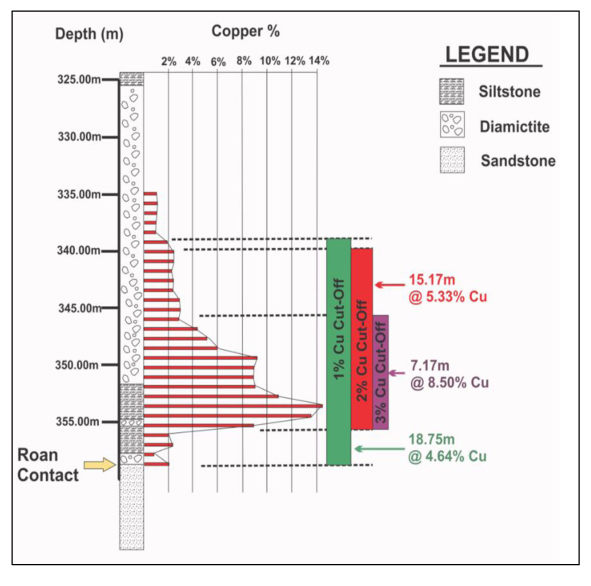
Updated estimate of Mineral Resources at Kamoa.
On February 23, 2016, Ivanhoe Mines released an updated estimate of Mineral Resources as part of its disclosure of the Kamoa pre-feasibility study. The Mineral Resources have been defined taking into account the 2014 CIM Definition Standards for Mineral Resources and Mineral Reserves.
Table 1: Kamoa Project Indicated and Inferred Mineral Resources (May 2014)
| Category | Tonnage (Mt) |
Area (km2) |
Copper (%) |
True Thickness (m) |
Contained Copper (kt) |
Contained Copper (billions lbs) |
| Indicated | 752 | 50.5 | 2.67 | 5.24 | 20,110 | 44.3 |
| Inferred | 185 | 16.8 | 2.08 | 3.87 | 3,840 | 8.5 |
- Dr. Harry Parker and Gordon Seibel, RM of SME, employees of Amec Foster Wheeler, are the Qualified Persons for the Mineral Resource estimate. The effective date of the estimate is May 5, 2014. Mineral Resources are reported inclusive of Mineral Reserves.
- Mineral Resources are reported using a total copper (TCu) cut-off grade of 1% TCu and an approximate minimum assumed thickness of 3 metres. There are reasonable prospects for eventual economic extraction under assumptions of a copper price of US$3.30/lb; employment of underground mechanized room and pillar and drift-and-fill mining methods; and that copper concentrates will be produced and sold to a smelter. Mining costs are assumed to be $34/t. Concentrator and General and Administrative costs are assumed to be $19/t. Metallurgical recovery will be 77% (supergene) and 85% (hypogene) at the average grade of the resource.
- Reported Mineral Resources contain no allowances for hanging wall or footwall contact boundary loss and dilution. No mining recovery has been applied.
- For Indicated Mineral Resources, 97.4% of the resource model blocks have a true thickness greater than 3 metres (range from 2.3 metres to 15.8 metres), for Inferred Mineral Resources, 94.7% of the resource blocks have a true thickness greater than 3 metres (range from 2.7 metres to 8.4 metres).
- Depth of mineralization below the surface ranges from 10 metres to 1,320 metres for Indicated Mineral Resources and 20 metres to 1,560 metres for Inferred Mineral Resources.
- Approximate drillhole spacings are 800 metres for Inferred Mineral Resources and 400 metres for Indicated Mineral Resources.
- Rounding as required by reporting guidelines may result in apparent summation differences between tonnes, grade and contained metal content.
Preparation for construction of first declines
Byrnecut Underground Congo SARL (BUCS) has been awarded the contract for the permanent support of the box-cut walls and the initial 1.2 kilometres of development for each of the two declines. BUCS staff, equipment and materials have been mobilized to site.
The project team at Kamoa has completed the construction of offices and workshops at the mine site, as well as power and fuel supply facilities to accommodate the decline development work. Upgrading and expansion of the Kamoa camp to accommodate the BUCS staff and other contractors is on schedule.
Figure 15: Double-boom drill rig parked in the BUCS temporary workshop.
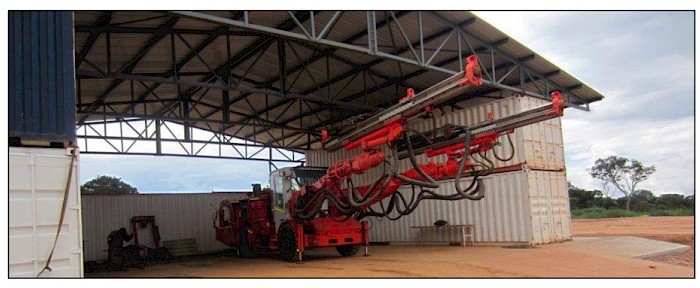
Figure 16: Drilling of anchor-bolt holes at the Kamoa box cut.
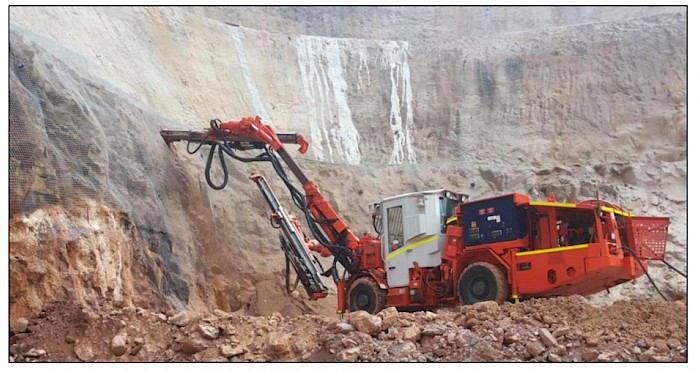
Pre-feasibility study results announced
Results of the Kamoa pre-feasibility study (PFS), involving the first phase of proposed mine development, were announced in February 2016.
Highlights include:
- Mine production of three million tonnes per annum (Mtpa) at an average grade of 3.86% copper over a 24-year mine life, resulting in annual copper production of approximately 100,000 tonnes.
- Initial capital cost, including contingency, is $1.2 billion, approximately $200 million lower than estimated in the Kamoa 2013 PEA.
- Life-of-mine average mine-site cash cost is $0.75/lb. of copper.
- After-tax net present value (NPV) at an 8% discount rate of $986 million.
- After-tax internal rate of return (IRR) of 17.2% and a payback period of 4.6 years.
- High-grade copper concentrate with an average grade of 39.2% copper and very low arsenic levels.
- Improvements to the mining method have the potential to reduce average mine site cash cost during the first phase to $0.61/lb. of copper, and improve the after-tax NPV at an 8% discount rate to $1.182 billion, the IRR to 18.9% and the payback period to 4.3 years.
The Kamoa 2016 PFS identified several areas for further evaluation to optimize the project’s economics, including:
- The use of controlled convergence room-and-pillar mining, which has been successfully used by KGHM Polska Miedź S.A. (KGHM) at its copper-mining operations in Poland for the past 20 years. Based on detailed analysis by KGHM Cuprum R&D Centre Ltd., this mining method appears to be well suited to the Kamoa deposit and, if implemented, potentially could provide significant cost savings as there would be no requirement for cemented backfill and ore extraction ratios would increase.
- Increased production up to 4 Mtpa from the proposed initial mining area, with only limited adjustments to the ore-handling and ventilation systems, thereby resulting in a more efficient use of capital.
Continued focus on community and sustainability
Upgrades to the Mbwetshi school were completed during Q4 2015, including the construction of two classrooms and the supply of desks and furniture. A number of activities related to community health improvement also were conducted.
Community projects for 2016 are under consideration and construction of an extension of the Musokantanda community clinic’s maternity ward is being studied.
Figure 17: The recently upgraded Mbwetshi school.
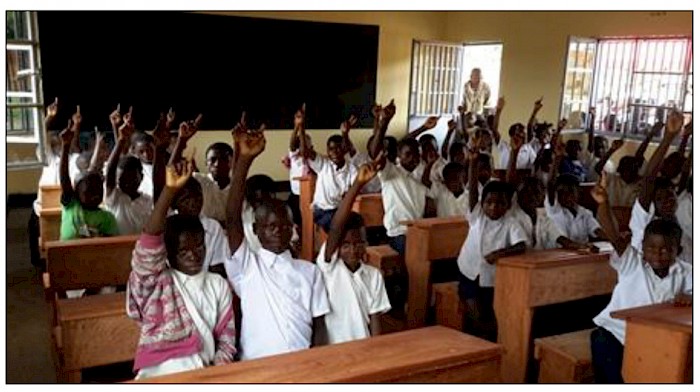
Kamoa continued with its livelihood sustainability program. During Q4 2015, the team focused on the completion of the harvesting of the 2015 maize (corn) crop, as well as ploughing, fertilizing and planting of the 2016 crop. Additional community-based activities included vegetable production, training, the construction of poultry coops, and livestock and poultry management.
Hydroelectric power plant upgrading project
The repairs to turbine number one at the Mwadingusha hydroelectric power plant are progressing and expected to be completed by the end of Q2 2016. The repairs are needed to allow the Mwadingusha plant to increase its output of electrical power to the national grid and thereby allow Kamoa to secure 10 megawatts of power from the grid for use during the development of the Kamoa Project.
Orders for the construction of the 120-kilovolt power line, which will supply construction power from the national grid and for the mobile substation (120/11kV), have been awarded. The supply of grid electrical power to the mine site and camp is expected to be available by Q4 2016.
Work on the full upgrade to the Mwadingusha power plant is progressing under the management of Kamoa’s energy team and the EPCM contractor, Stucky. Bids have been requested from three potential suppliers for the complete upgrading of the four turbines.
SELECTED ANNUAL FINANCIAL INFORMATION
This selected financial information is in accordance with IFRS as presented in the annual consolidated financial statements. Ivanhoe had no operating revenue in any financial reporting period and did not declare or pay any dividend or distribution in any financial reporting period.
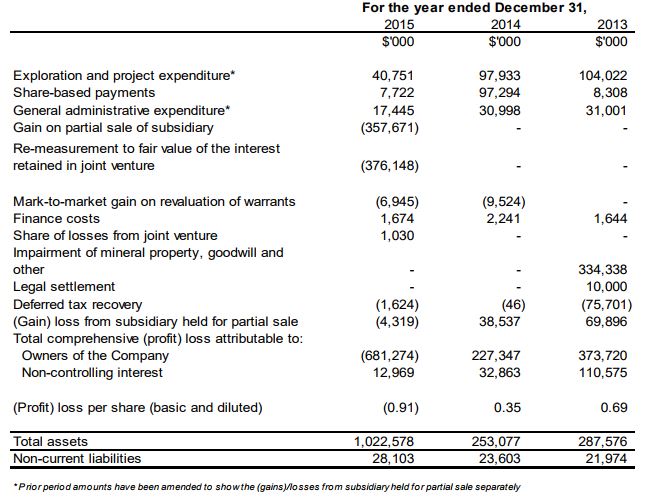
DISCUSSION OF RESULTS OF OPERATIONS
Review of the yearendedDecember 31, 2015 vs. December 31, 2014
The company recorded a total comprehensive profit of $668.3 million for the year ending December 31, 2015 compared to a total comprehensive loss of $260.2 million for the year ending December 31, 2014. The profit in 2015 was attributable mainly to the gain on the partial sale of Kamoa Holding of $357.7 million and the re-measurement to fair value of the interest retained in the joint venture of $376.1 million.
The company sold a 50.5% stake in Kamoa Holding, the company that owns 95% of the Kamoa project. The company sold a 49.5% stake to Zijin Mining Group Co., Ltd. (“Zijin”) – through its subsidiary, Gold Mountains (H.K.) International Mining Company Limited, in addition, the company has sold 1% of its share interest to Crystal River Global Limited (“Crystal River”). Under the terms of the share acquisition agreement, Zijin bought a 49.5% share interest for an aggregate consideration of $412 million. The purchase price was satisfied by an initial payment of $206 million in cash upon the closing of the transaction. The agreement specifies that the remaining $206 million will be paid in five equal installments, payable every 3.5 months from closing and continuing through the remainder of 2016 and into 2017.
Crystal River paid its purchase consideration of $8.32 million through a non-interest-bearing, 10-year promissory note. Upon closing of the transaction, each shareholder is required to fund Kamoa Holding in an amount equivalent to its proportionate shareholding interest.
The present value of the purchase consideration at the closing date, net of transaction costs, amounted to $390.4 million.
As required under IFRS, the company:
- derecognized the assets and liabilities of Kamoa Holding from the consolidated statement of financial position which amounted to $48.8 million immediately prior to the sale;
- derecognized the carrying value of non-controlling interest of $16.0 million;
- recognized the investment retained at its fair value, deemed to be $408.2 million;
- recognized the gain associated with the sale of $357.7 million and the re-measurement to fair value of the interest retained in the joint venture of $376.1 million; and
- subsequently accounted for Kamoa as a joint venture using the equity method of accounting.
The company’s share of the losses of the joint venture, from the closure of the sale until December 31, 2015, amounted to $1.0 million.
When excluding the gain on the partial sale of Kamoa Holding of $357.7 million and the re-measurement to fair value of the interest retained in the joint venture of $376.1 million, the company’s total comprehensive loss for the year ending December 31, 2015 amounted to $65.5 million. This is $194.7 million lower than for the same period in 2014 ($260.2 million). The decrease mainly was due to the share-based payment expense of $88.6 million, recognized in 2014 as a result of the Platreef B-BBEE transaction, as well as the capitalization of development costs in the current period on the Platreef and Kamoa projects of $48.8 million and $32.9 million respectively.
The mark-to-market gain on revaluation of warrants of $6.9 million (2014: $9.5 million) is as a result of the classification and treatment of the share-purchase warrants issued in 2014 as a financial liability at fair value, with changes in fair value included in net earnings. The company’s share-purchase warrants were valued using quoted prices in active markets and expired during December 2015.
Exploration and project expenditures for the year ending December 31, 2015, were $57.2 million less than for the same period in 2014. With the focus on development at the Kamoa and Platreef projects during 2015, $33.6 million of the total $40.8 million exploration and project expenditure was related to Kipushi. A total of $4.1 million was related to retrenchment costs incurred in the closure of Ivanhoe’s regional exploration company in the DRC.
Expenditure at the Kipushi Project decreased by $16.1 million compared to the same period in 2014.
Financial positionas atDecember31, 2015 vs. December 31, 2014
The company’s total assets increased by $769.5 million, from $253.1 million as at December 31, 2014, to $1,022.6 million as at December 31, 2015. This mainly was due to the company selling 50.5% of its shareholding in Kamoa Holding as described above.
Zijin paid $206 million of the purchase consideration on closing, resulting in the increase in cash and cash equivalents. The remaining $206 million will be received in five equal installments, payable every 3.5 months from the date of closing. The present value of the remaining consideration receivable, net of transaction costs, was $192 million as at December 31, 2015. The first of the five installments was received on March 23, 2016.
As a result of the partial sale of Kamoa Holding, the company treated Kamoa as a joint venture, with joint control being shared by Ivanhoe and Zijin from the date of sale. The carrying value of the company’s interest retained in the joint venture was $412.0 million as at December 31, 2015.
The company received a $8.32 million non-interest-bearing, 10-year promissory note as the purchase consideration for selling 1% of its share in Kamoa Holding to Crystal River.
Property, plant and equipment increased by $26.5 million, with a total of $87.5 million being spent on project development and to acquire other property, plant and equipment. Development costs on the Platreef and Kamoa projects amounted to $48.8 million and $32.9 million respectively, however the carrying value of property, plant and equipment derecognized on the sale of Kamoa Holding amounted to $41.7 million.
The company utilized $45.0 million of its cash resources in its operations and earned interest income of $1.3 million on cash balances in the year ended December 31, 2015. A total of $87.5 million was spent to acquire property, plant and equipment, and investments in short-term deposits of $55.2 million were transferred to cash and cash equivalents.
The company generated cash inflow from financing activities during the year ending December 31, 2015, of $271.0 million. This mainly was a result of proceeds received from Zijin for the partial sale of Kamoa Holding, as well as the proceeds from the 76,817,020 common shares issued to a Zijin subsidiary, through a private placement at a price of C$1.36 per share, that yielded proceeds of $85.2 million.
The company’s total liabilities decreased to $43.8 million as at December 31, 2015, from $50.7 million as at December 31, 2014. This mainly was due to the expiry of the share-purchase warrants issued in Q2 2014 that had a fair value of $6.9 million at December 31, 2014.
This release should be read in conjunction with Ivanhoe Mines’ audited 2015 Financial Statements and Management’s Discussion and Analysis report available at www.ivanhoemines.com and at www.sedar.com.
Qualified Person
Disclosures of a scientific or technical nature in this news release have been reviewed and approved by Stephen Torr, who is considered, by virtue of his education, experience and professional association, a Qualified Person under the terms of NI 43-101. Mr. Torr is not considered independent under NI 43-101 as he is the Vice President, Project Geology and Evaluation. Mr. Torr has verified the technical data disclosed in this release.
Ivanhoe has prepared a current independent NI 43-101-compliant technical report for each of the Platreef Project, the Kipushi Project and the Kamoa Project, which are available under the company’s SEDAR profile at www.sedar.com. These technical reports include relevant information regarding the effective date and the assumptions, parameters and methods of the mineral resource estimates on the Platreef Project, the Kipushi Project and the Kamoa Project cited in this release, as well as information regarding data verification, exploration procedures and other matters relevant to the scientific and technical disclosure contained in this release in respect of the Platreef Project, Kipushi Project and Kamoa Project.
Information contacts
Investors
Bill Trenaman +1.604.331.9834
Media
North America: Bob Williamson +1.604.512.4856
South Africa: Jeremy Michaels +27.82.939.4812
Website www.ivanhoemines.com
Forward-looking statements
Certain statements in this release constitute “forward-looking statements” or “forward-looking information” within the meaning of applicable securities laws, including without limitation, the timing and results of: (i) statements regarding the projected depth of Shaft 1 at the Platreef Project in 2018 and the timing of the commencement of Shaft 2 development, including early works; (ii) statements regarding the operational and technical capacity of Shaft 1; (iii) statements regarding the internal diameter and hoisting capacity of Shaft 2 (iv) statements regarding peak water use of 10 million litres per day at the Platreef Project and development of the Pruissen Pipeline Project; (v) statements regarding the completion of a new resource estimate at the Platreef Project; (vi) the de-watering program at the Kipushi Project; (vii) statements regarding the completion of the Kipushi Project Environmental, Social and Health Impact Assessment (ESHIA) baseline study; (viii) statements regarding when a preliminary economic assessment for the Kipushi Project will be finalized and published; (ix) statements regarding the date that construction of the first set of Kamoa twin declines is expected to commence; (x) statements regarding the declines having been designed to intersect the high-grade copper mineralization in the Kansoko Sud area; (xi) statements regarding plans to begin an accelerated, 800-metre-spacing infill grid drilling program at the Kakula Discovery area in May, 2016 and statements regarding the focus of the program is to delineate a zone of flat-lying, shallow copper resources at materially higher grades that could be incorporated in the Kamoa Phase One feasibility study; (xii) statements regarding the timing, size and objectives of drilling and other exploration programs for 2016 and future periods; (xiii) statements regarding the completion of installation and repair works at the Mwadingusha power plant.
Such statements involve known and unknown risks, uncertainties and other factors that may cause the actual results, performance or achievements of the company, or industry results, to be materially different from any future results, performance or achievements expressed or implied by such forward-looking statements or information. Such statements can be identified by the use of words such as “may”, “would”, “could”, “will”, “intend”, “expect”, “believe”, “plan”, “anticipate”, “estimate”, “scheduled”, “forecast”, “predict” and other similar terminology, or state that certain actions, events or results “may”, “could”, “would”, “might” or “will” be taken, occur or be achieved. These statements reflect the company’s current expectations regarding future events, performance and results and speak only as of the date of this release.
As well, the results of the pre-feasibility study of the Kamoa Project and the pre-feasibility study of the Platreef Project constitute forward-looking information, and include future estimates of internal rates of return, net present value, future production, estimates of cash cost, proposed mining plans and methods, mine life estimates, cash flow forecasts, metal recoveries, and estimates of capital and operating costs. Furthermore, with respect to this specific forward-looking information concerning the development of the Kamoa and Platreef Projects, the company has based its assumptions and analysis on certain factors that are inherently uncertain. Uncertainties include: (i) the adequacy of infrastructure; (ii) geological characteristics; (iii) metallurgical characteristics of the mineralization; (iv) the ability to develop adequate processing capacity; (v) the price of copper, nickel, platinum, palladium, rhodium and gold; (vi) the availability of equipment and facilities necessary to complete development; (vii) the cost of consumables and mining and processing equipment; (viii) unforeseen technological and engineering problems; (ix) accidents or acts of sabotage or terrorism; (x) currency fluctuations; (xi) changes in regulations; (xii) the availability and productivity of skilled labour; (xiii) the regulation of the mining industry by various governmental agencies; and (xiv) political factors.
This release also contains references to estimates of Mineral Resources. The estimation of Mineral Resources is inherently uncertain and involves subjective judgments about many relevant factors. Mineral Resources that are not Mineral Reserves do not have demonstrated economic viability. The accuracy of any such estimates is a function of the quantity and quality of available data, and of the assumptions made and judgments used in engineering and geological interpretation (including estimated future production from the company’s projects, the anticipated tonnages and grades that will be mined and the estimated level of recovery that will be realized), which may prove to be unreliable and depend, to a certain extent, upon the analysis of drilling results and statistical inferences that ultimately may prove to be inaccurate. Mineral Resource estimates may have to be re-estimated based on: (i) fluctuations in copper, nickel, platinum group elements (PGE), gold or other mineral prices; (ii) results of drilling; (iii) metallurgical testing and other studies; (iv) proposed mining operations, including dilution; (v) the evaluation of mine plans subsequent to the date of any estimates; and (vi) the possible failure to receive required permits, approvals and licenses.
Forward-looking statements involve significant risks and uncertainties, should not be read as guarantees of future performance or results and will not necessarily be accurate indicators of whether or not such results will be achieved. A number of factors could cause actual results to differ materially from the results discussed in the forward-looking statements, including, but not limited to, the factors discussed below and under “Risk Factors”, as well as unexpected changes in laws, rules or regulations, or their enforcement by applicable authorities; the failure of parties to contracts with the company to perform as agreed; social or labour unrest; changes in commodity prices; and the failure of exploration programs or studies to deliver anticipated results or results that would justify and support continued exploration, studies, development or operations.
Although the forward-looking statements contained in this release are based upon what management of the company believes are reasonable assumptions, the company cannot assure investors that actual results will be consistent with these forward-looking statements. These forward-looking statements are made as of the date of this release and are expressly qualified in their entirety by this cautionary statement. Subject to applicable securities laws, the company does not assume any obligation to update or revise the forward-looking statements contained herein to reflect events or circumstances occurring after the date of this release.
The company’s actual results could differ materially from those anticipated in these forward-looking statements as a result of the factors set forth in the “Risk Factors” section in the company’s MD&A for the year ended December 31, 2015.


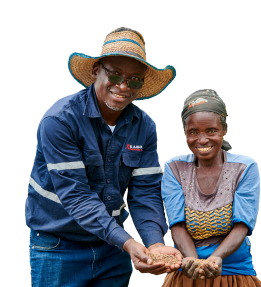
 English
English Français
Français 日本語
日本語 中文
中文